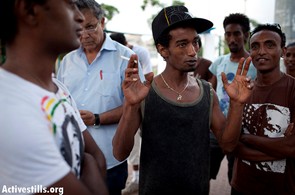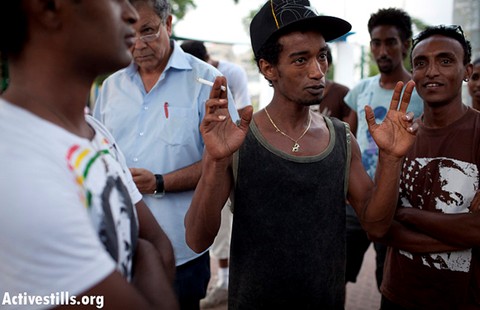
The social protest leaders say that instead of another mass rally in Tel Aviv, next Saturday night (August-13), demonstrations will be held in outlying areas around the country. The student union at Ben-Gurion University of the Negev says it is organizing a rally in Be’er Sheva. This meeting will be preceded by rallies in Tel Aviv, Jerusalem, Haifa and Kiryat Shmona.
The National Student Union says the protests this coming Saturday night will call for the suspension of privatization and a limit on workers contracted by human resource agencies. More protests will be held in Haifa, Afula and others cities. Leaders of the social protest sweeping across Israel added another item to their growing list of demands Tuesday – electricity rates.

Ori Beriyon, activist from the Ethiopian community, is seen yesterday after he was released from arrest in Levinsky tents city (Photo: Activestills)
In what has already been deemed as miserable timing, the neo-liberal government on Sunday sanctioned a 10% increase in electric rates for domestic use. The hike will take effect next week. Heeding the protest leaders’ call, some 200 people marched – torches in hand – from the Horses Park (“Gan Hasus”) towards Prime Minister Benjamin Netanyahu’s Jerusalem residence.
Protesters were shouting “We want justice not charity,” “The people demand social justice,” “Bibi, go home” and “Away with darkness,” and carrying red flags and banners “This isn’t a mistake – it’s policy,” “The people demand a future” and “Bibi, we can’t pay your price.”
“We’re not surprised that Netanyahu raised electricity prices and is steadily ignoring the masses,” activist Dana Gan’el said. “He’s a neo-liberal and that’s his economic policy. But we won’t stand for it. The protests will continue until Netanyahu realizes he is dealing with the entire nation.”
Demo in solidarity with social activist
Hundreds of Israelis and African asylum-seekers gathered together yesterday night to hold an outdoor concert in a South Tel Aviv park, to demonstrate solidarity with a social protest leader who had been arrested earlier in the day on suspicion of assaulting a police officer.
The organizer of a contingent of Ethiopian-Israelis camping in the park in protest of the high cost of living in Israel told the hastily-convened crowd of supporters of the circumstances surrounding his arrest. Later, live musicians performed traditional Abyssinian songs and rap music in English and Tigrigna for the assembled crowd.
Dozens of municipal parks and other public spaces across the country have been hosting protest camps since July 14, when a group of Tel Aviv activists pitched tents on the grassy median on Rothschild Boulevard, a thoroughfare in the city center with high pedestrian traffic, to decry the high cost of housing. Within a week and a half, another protest camp was established in Levinsky Park, by social activists among them several Hadash members, where many homeless African asylum-seekers sleep outside on the grass. The Levinsky camp has attracted residents of the city’s impoverished southern neighborhoods, who are demanding housing for all, regardless of citizenship.
Ori Beriyon, 28, denies the charge of assaulting a police officer. “A few hours ago, I was arrested by the police for jay-walking. They handcuffed me, treated me brutally,” Beriyon told Haaretz late Tuesday. “No one can break me, no one can take away my spirit. I told them that. You can take away my body, but I will always be down for the struggle.”
Beriyon said that he organized a group of Ethiopian-Israelis to support the Levinsky protest camp because it represents the weakest sectors of Israeli society. “If we citizens don’t stand up and take responsibility for the future, for the weaker people, the ones the system abandoned long ago — if we don’t do it, it’ll come back to us in the end,” he said.
“None of us is immune to it. If we don’t demonstrate mutual aid and realize that without me, you are nothing — and the opposite — we’ll never do well. Never,” continued Beriyon. “We must remember this: That if the weak one is in pain, then it’s up to the strong one to get up and help him up.”
The Levinsky camp has had repeated confrontations with the police since it was established on July 24. City officials evicted groups of activists and confiscated their tents on two consecutive occasions, but relented after the camp was re-established for the third time. The camp has since grown from about ten tents to several dozen in total, with an outdoor communal kitchen.
Activists at other Tel Aviv protest camps claim that their tents were confiscated by city officials earlier Tuesday. Tel Aviv Mayor Ron Huldai publicly said Sunday that the activists have the right to protest in the public space, but hinted that “they cannot expect to continue to squat on public property indefinitely”. Municipality clerks attempted to impound tents from two different campsites in northern Tel Aviv Tuesday morning, activists reported.


